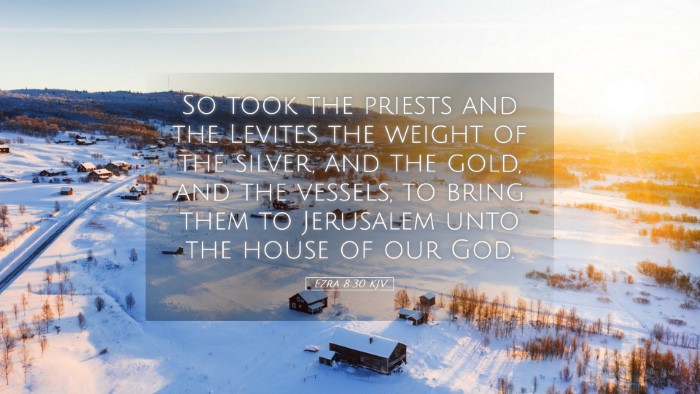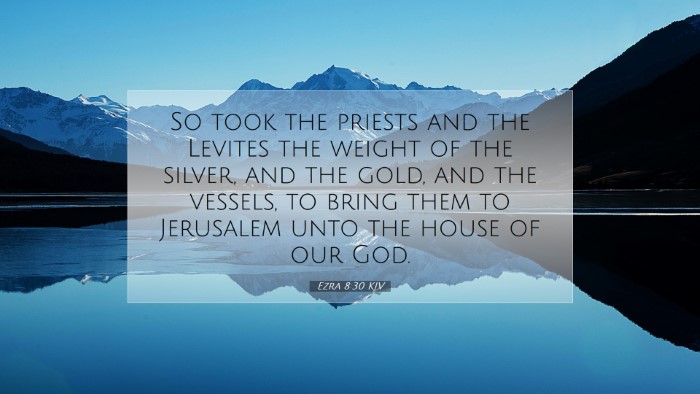Comprehensive Commentary on Ezra 8:30
Verse: "So took the priests and the Levites the weight of the silver and the gold, and the vessels, to bring them to Jerusalem unto the house of our God."
Introduction
This verse marks a pivotal moment in the narrative of the book of Ezra, which details the return of the Jewish exiles from Babylon to Jerusalem. In Ezra 8:30, we see the solemn dedication and responsibility taken by the priests and Levites regarding the treasures entrusted to them. The context of this act is steeped in themes of faith, stewardship, and the divine calling of God's people.
Contextual Analysis
Ezra 8 describes the return of the exiles and the preparations made for their journey. Ezra, as a leader of the people, emphasized the importance of returning not just with people but also with offerings that would glorify God in the rebuilding of the temple. The preceding verses outline the enumeration of those who would return and the careful inventory of the treasures to be transported.
Weight of Responsibility
The explicit mention of the "weight" of silver, gold, and vessels signifies more than mere physical burdens; it symbolizes leadership's immense responsibility in fulfilling God's mandates.
Insights from Commentaries
Matthew Henry's Commentary
Henry emphasizes the spiritual significance of this act of transporting treasures to the house of God. He highlights that the priests and Levites were not required to do this merely as a duty but as a solemn act of worship and dedication. They recognized the significance of their roles and the trust placed in them by God. Henry outlines the following key themes:
- Divine Provision: The silver and gold represent God's provision for His people, as they return to restore worship in Jerusalem.
- Accountability: The act of taking the treasures was a matter of great accountability. The leaders understood that they were responsible not only to Ezra but also to God.
- Holy Tribute: The vessels carried were intended for the temple and signify a return to proper worship practices.
Albert Barnes' Notes on the Bible
Barnes delves into the logistical aspects of this undertaking, recognizing the risks involved in such a journey. He notes that Ezra had been cautious in assembling a company for the journey, emphasizing the providence of God in protecting His people. Key points from Barnes include:
- Protection in Obedience: By proclaiming a fast and seeking God's protection, Ezra exemplifies the principle that obedience leads to divine favor and safety.
- Symbolism of the Gifts: The silver and gold are more than monetary; they symbolize the wealth of God’s favor and blessings that should be returned in service.
- Leadership's Role: The role of the priests and Levites in this venture underscores the leadership responsibility in guiding community efforts to restore worship.
Adam Clarke's Commentary
Clarke provides a thorough analysis of the cultural and religious implications of this event. He reflects on the significance of the priesthood in Jewish society and the necessary protocols adhered to when transporting such valuable items.
- Ceremonial Importance: Clarke notes the ceremonial procedures involved in handling sacred items, which the priests were trained for, indicating the gravity of this undertaking.
- Community Participation: The involvement of various families signifies a collective commitment to God's work. The effort was a community one, fostering unity among those returning.
- Historical Significance: Understanding the historical context of these treasures adds depth to their importance, as they connect the returning exiles with the worship practices symbolized by the temple.
Theological Implications
The theological insights of Ezra 8:30 challenge modern readers and leaders in the church today concerning stewardship and accountability in the face of divine duty. The act of carrying these treasures is akin to the spiritual treasures entrusted to the Church today, which include the Gospel message and the call to serve:
- Stewardship: How are we managing what God has entrusted to us? The verse calls pastors and leaders to reflect on their stewardship roles.
- Pursuit of Holiness: This passage emphasizes the necessity of holiness in handling what is sacred, prompting believers to consider how they treat their own spiritual commitments.
- Commitment to Community: The collaboration between priests and Levites exemplifies the church's need for unity in purpose and resources.
Conclusion
Ezra 8:30 serves as a powerful reminder of the importance of spiritual and physical responsibilities that are tied to the worship of God. It encapsulates the call for modern believers to engage deeply with their faith, understanding that every act of service is a reflection of sacred trust. As they learn from the example of Ezra and the returning exiles, they are encouraged to carry forth the treasures—both material and spiritual—that have been given to them, thereby fulfilling divine commission with diligence and integrity.


